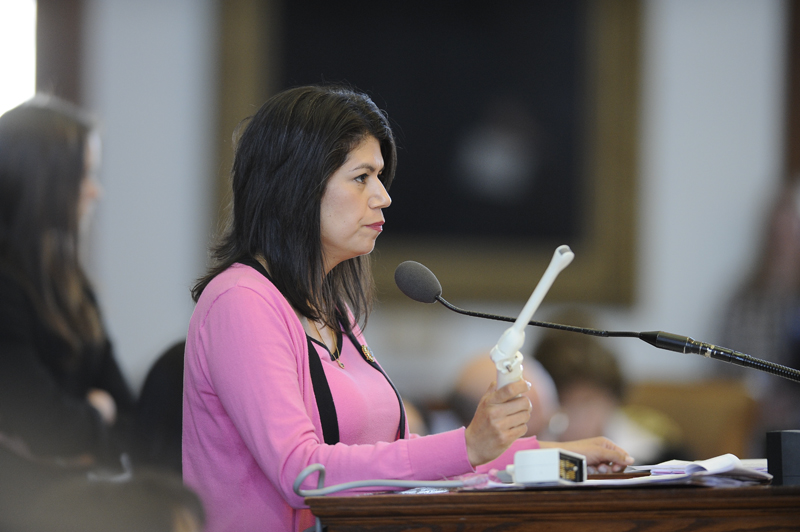Possible new hope, but not any time soon.
Attorneys who represented Texas doctors in a lawsuit against the state’s 2011 abortion sonogram law are considering their legal options following the U.S. Supreme Court’s Monday decision not to revive a similar North Carolina law.
The high court refused to reconsider a North Carolina appellate court’s decision striking down a state law that would have required doctors to perform an ultrasound on a pregnant woman and describe the fetus before she could obtain an abortion. Texas has a similar sonogram law — which has been upheld by a federal appeals court.
“We are in the process of evaluating our legal options in light of today’s order out of the Supreme Court which allowed strong lower court rulings to stand,” said Julie Rikelman, litigation director for the New York-based Center for Reproductive Rights, which filed suit against the sonogram law in North Carolina and Texas.
The Texas law requires doctors to perform a sonogram at least 24 hours before an abortion, display the sonogram images, make the heartbeat audible and provide a verbal explanation of the sonogram results to the woman. Doctors must also describe the medical risks of an abortion and determine the gestational age of the fetus.
In 2012, the U.S. 5th Circuit Court of Appeals upheld the Texas sonogram law.
The Virginia-based 4th Circuit created a split among appellate courts when it ruled against North Carolina’s law last year, making it more likely that the Supreme Court would take up the issue.
In deciding not to consider the North Carolina case, the high court left in place the appellate court’s ruling that struck down the law in that state. The Texas law was not appealed to the Supreme Court.
See here, here, here, and here for the background. Technically, the Fifth Circuit did not uphold the sonogram law, they vacated the injunction against enforcing it while it was being appealed. As far as I can tell, the Fifth Circuit didn’t hear an appeal on the merits of the case – which, remember, was won by the plaintiffs – they just disagreed with the district court when it ruled that the plaintiffs would be likely to prevail on their claims. I’m not a lawyer and I don’t fully grasp all of the legal hair-splitting here, I just know this is not quite the same as what the Trib story states. Unless I’m wrong about that, in which case I hope one of the attorneys in my audience corrects me.
Anyway. The Fourth Circuit ruled that North Carolina’s sonogram law, which required doctors and technicians to perform an ultrasound, display the image of the sonogram, and specifically describe the fetus to any pregnant woman seeking an abortion, even if the woman actively “averts her eyes” and “refuses to hear”, was a compelled speech provision that violates the First Amendment rights of medical providers. The Fifth Circuit ruling reminds us what was in contention in the Texas case:
H.B. 15, passed in May 2011, substantially amended the 2003 Texas Woman’s Right to Know Act (“WRKA”). The amendments challenged here are intended to strengthen the informed consent of women who choose to undergo abortions. The amendments require the physician “who is to perform an abortion” to perform and display a sonogram of the fetus, make audible the heart auscultation of the fetus for the woman to hear, and explain to her the results of each procedure and to wait 24 hours, in most cases, between these disclosures and performing the abortion. TEX. HEALTH & SAFETY CODE § 171.012(a)(4). A woman may decline to view the images or hear the heartbeat, § 171.0122(b), (c), but she may decline to receive an explanation of the sonogram images only on certification that her pregnancy falls into one of three statutory exceptions. Id. at § 171.0122(d).
Again, not a lawyer, but that sounds fairly similar to the North Carolina law. The Chron story, however, suggests that it doesn’t really matter.
That means opponents of the Texas law would have to convince the 5th U.S. Circuit Court of Appeals to reconsider its 2012 decision or take up a new challenge – avenues that both are unlikely to succeed, legal experts said.
“The courts are likely to say, ‘we’ve already decided that issue,'” said Caitlin Borgmann, a professor at the City University of New York Law School.
Lyle Denniston, a reporter who has covered the Supreme Court for 57 years and now writes for SCOTUSBlog, said a motion for reconsideration was not even a long shot.
Absent a successful motion, he said, “the Texas case is over and done.”
[…]
On Monday, some legal experts and abortion activists saw the high court’s decision as a possible sign that the justices were holding off on taking up an abortion case until being able to consider a more complicated and controversial one – such as House Bill 2.
“The House Bill 2 case just makes a better vehicle because it has a number of different restrictions and it’s fairly representative of what’s going on (across the country),” said Carl Tobias, a law professor at the University of Richmond in Virginia. “Maybe that’s what’s going on, that they’re waiting.”
Tobias and others said it was much less likely that there would be future action on the Texas sonogram law.
HB2 is of course the abortion bill from 2013 that the Fifth Circuit just did its thing on. Sure would be nice to have a decent Circuit Court of Appeals over us, but we don’t. So now we get to wait and see how the legal process plays out with the Supreme Court. Daily Kos and RH Reality Check have more.


Pingback: The Fifth Circuit still sucks – Off the Kuff